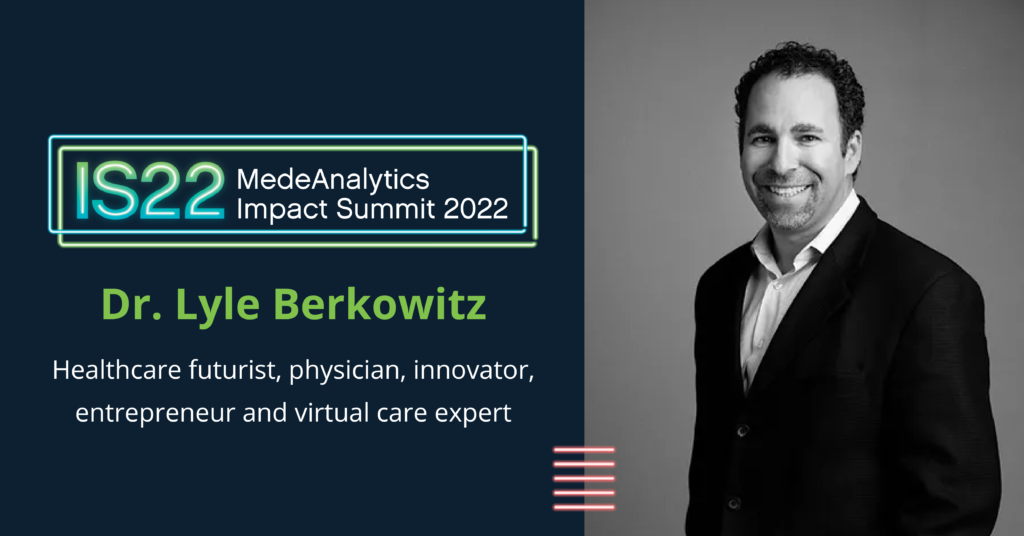Estimated reading time: 4 minutes

After an excellent keynote session led by Dr. Lyle Berkowitz at our 2022 Impact Summit (read the full talk summary here!), healthcare expert and MedeAnalytics executive Andy Dé sat down with Dr. Berkowitz for a follow-up Q&A about technological innovations in healthcare. Read through their fascinating discussion below!
Dé: How far are we from realizing the true vision of precision medicine?
Berkowitz: I’d argue that it is here; it is just not evenly distributed. Let’s look at a couple of examples—first, pharmacogenomics. We can use your genomic data to proactively understand how you will react to certain drugs—and this information can be seamlessly integrated into EMRs and workflows. Genomics can also help us understand health risks and make custom recommendations for lifestyle adjustments or treatments. For instance, assessing the genetics of a cancer patient can support more tailored interventions, tests and medications.
Also, genomics directly ties into proteomics—the analysis of proteins—because changes in proteins can be a key indicator of risk. Big data is integral to this, as there are thousands of proteomics that in different combinations can reveal new things and help clinicians make better decisions.
The question remains – how will we pay for all of this?
Dé: Are physicians open to automated and self-service care to drive efficiencies and productivity?
Berkowitz: That’s a great question—and yes, there are a number of examples where it makes sense to lean into those options. COVID screening is a great use case. We were overwhelmed with patients who were mostly asking the same basic questions. In response, we created chatbots and simple questionnaires to empower patients at home to make informed decisions, while relieving unnecessary stress on providers and the health system. Another excellent way to apply automation is within the clinical team’s routine workflows. For instance, automation can improve the prescription refill process by using evidence-based rules to determine if the task required a doctor or could be delegated to a nurse—rather than just sending everything through to the doctor and inevitably increasing workload.
For physicians to get on board, they need affirmative answers to two important questions:
- Is the automation or self-service module built on evidence-based, science-supported rules?
- Will reimbursement and revenue remain the same (or improve) for us?
Dé: How do you see analytics and AI playing a role in improving this type of automated care?
Berkowitz: There are several simple ways in which preventative care can be automated based on age and demographics. Think: cancer screenings, vaccines, mammograms or colonoscopies. Where AI and analytics come into play is when a patient’s record or background is not so straightforward. If there are complexities or comorbidities in a patient’s history, AI helps determine if more preventative measures are warranted (e.g., increased frequency of screenings). Care pathways for common conditions and diseases are often standardized, but AI and analytics offer critical support and insight for the edge cases—that 10-20% of people whose care plans require thoughtful adjustments.
Dé: Do you think we will see more analytics and AI in healthcare being adopted for operational supply chain, forecasting, detection of fraud, and other nonclinical situations, as well as in clinical settings?
Berkowitz: There are a lot of interesting ways to use analytics in both clinical and nonclinical settings. The important thing to remember is that AI can alert us to things we may have missed, rather than lay down rules we have to follow. We aren’t relying on a machine to tell us what to do; we are applying data from a wide span of sources (e.g., provider efficiency metrics, patient volume trends, sepsis monitoring) to provide warnings, updates and recommendations for next steps.
Dé: Who do you think is best positioned to bring the patient-level dashboard concept to fruition?
Berkowitz: I believe that most of this should be born out of the EMR vendors, as the majority of Americans already have data with access to their charts through one of the larger EMRs. While patients interested in engaging in their medical information will vary, the visualization of patient data in dashboards will always be very useful for providers. In a quick view, busy clinicians can assess complex situations and make informed decisions. Whether or not EMRs rise to this challenge themselves, or other innovators are required to overlay and support these initiatives, is yet to be seen.
See the full conversation between Dr. Berkowitz and Andy Dé.
Get our take on industry trends
Adapting nursing education and practice in a post-pandemic, technology-dependent world
Can AI help reduce nurse burnout? What role should nurses play in regulatory conversations? How do clinical training programs incorporate…
Read on...Championing transparent technology: Why we’ll always show you behind the scenes
Modern, tech-enabled innovations are demonstrating immense potential to transform the way healthcare is planned, delivered and paid for in the…
Read on...Optimize your revenue cycle for today’s challenges and tomorrow’s goals
In this dynamic LinkedIn Live discussion, Christine Stetler, BSN, RN and AVP of Solution Engineering at MedeAnalytics, unearthed strategies for…
Read on...Enhancing healthcare delivery with explainable AI: A methodological leap forward
Healthcare providers and payers continually seek methods to enhance patient care and operational efficiency. With the advent of complex data…
Read on...


